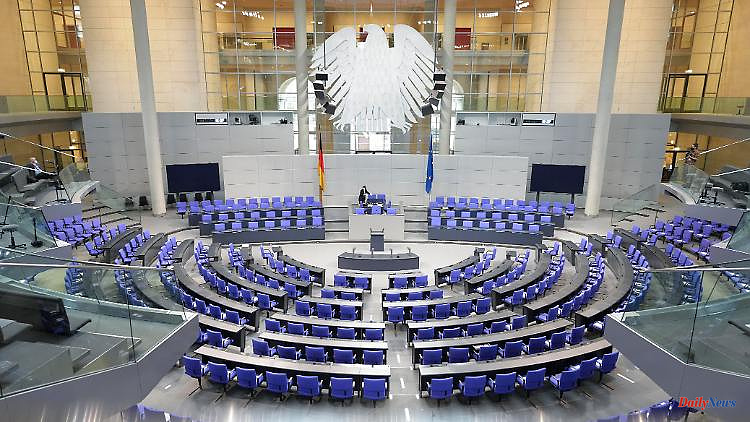Corona, war and inflation: The Bundestag, which met in autumn with its many new members, started the legislative period extremely stressed. The long-awaited summer break could come to an abrupt end if Russian gas stops in two weeks.
Shortly before vacation, people feel the same way: the last days in the office are always particularly stressful if you want to leave your desk as empty as possible. In the last week of the Bundestag session, there was a record session lasted until 2 a.m. on Thursday night, so that as many topics as possible could be processed. If the AfD parliamentary group hadn't forced the quorum of the Bundestag to be checked, the MPs would have made it even longer. But after all, Friday was another day, and as I said: the holidays will soon be here. It is only more than uncertain how long they will be absent for the MPs.
On Monday, the Russian gas pipeline Nord Stream 1 goes into the regular ten-day maintenance break. In political Berlin, people have long been prepared for the fact that President Vladimir Putin will order a delivery stop even after the maintenance work has been completed. Federal Minister of Economics Robert Habeck has been warning for two weeks that a technical reason could be found in Russia that could be used as an excuse for continued delivery failures. Nobody knows whether it will really come to that. But if so, the hope for some relaxation in the summer is gone.
"Don't swim too far out," faction leaders called out to their deputies in earlier times of crisis before they went on vacation. So too now: "There can be situations in which we need a special session," says Katja Mast, parliamentary director of the SPD. "That's why I advise my colleagues to be easily accessible." The Green MPs were also advised not to go to the diving station and to maintain contact with Berlin. This shouldn't be a problem for the vast majority of MPs, since being an MP means you're always available. Especially since many parliamentarians are news junkies constantly checking their smartphones, especially in times of war.
There is a lot to discuss in an emergency: If the gas stays away, the last and highest emergency level three would be called out. Then gas is rationed and allocated according to priority. The procedure would be extraordinarily complex: the allocation would also be based on the supply infrastructure, i.e. on the line network. Consumers and companies are mostly tied to the same pipes, and some municipal utilities don't have a procurement problem on paper even without Russian gas because they have very long-term supply contracts. Ultimately, the allocation would be very unequal and not always based on the question of which people and companies have the highest priority.
Even if the Bundestag does not have a say and the Federal Network Agency, which reports to the Federal Ministry of Economics, regulates this, such an emergency could hardly happen without a debate in the Bundestag and without a declaration from the government. In addition, laws that have long been in preparation may have to be passed in a fast-track procedure. Economics Minister Habeck has been working on preparations for emergencies since December. But it wasn't enough to fill up the German gas storage facilities, a minimum requirement to get Germany through an average winter. On Monday, when the maintenance of Nord Stream 1 begins, the storage tanks will be almost 65 percent full.
In addition to the war in Russia, there is something else: "My own vacation plans have shrunk in recent weeks," said Federal Health Minister Karl Lauterbach on Friday in Berlin. He referred to regulations that were to be launched, to the ongoing consultations on a new regulation of the Infection Protection Act and preparations for the fall, "because we assume that we will have to deal with a significant fall wave".
This also applies to the members of the health committee. The Infection Protection Act expires on September 23. From the point of view of most government politicians, at least one return of the mask requirement indoors will probably be necessary if the summer wave, which has so far been unchecked, is combined with cooling outside temperatures. There is also the possibility of further virus mutations. Unfortunately, the pandemic will not go into the summer break, said Lauterbach. But that also applies to fighting the pandemic. "We cannot afford to go into the fall a third time unprepared or ill-prepared."
It is not unusual for individual committees to work during the parliamentary holidays. However, the health committee has been particularly burdened by the pandemic for years. Above all, work and discussions about the ultimately failed vaccination were exhausting. Overall, Parliament passed 54 laws and amendments to laws in the first nine months of the legislative period. That is a very high figure, even though each legislative period since reunification has introduced between 400 and 600 laws and legislative amendments. These still have to be worked out first, which takes a lot of time after a change of government with lots of new ministry leaders. But neither the government nor parliament had the opportunity to warm up, as the crises brought with them.
The pressure on the ministries is also not easing, especially not in Habeck's Ministry of Economics and Climate Protection, where short-term alternatives to Russian raw materials, the accelerated conversion to renewable energies and the fight against an impending recession have to be worked on at the same time. A member of the coalition committee also attributed the fact that there has recently been increased friction in the coalition to the nerves lying on bare nerves after months of crisis mode.
Like the whole country, political Berlin urgently needs a break, but nobody can be away for long or too far. But anyway, MPs won't rest until September 5th, the start of the next week of parliamentary sessions. The elected representatives will spend a large part of the next two months in their constituencies. There they will most certainly follow the topics of war, energy security, pandemic and price pressure.
(This article was first published on Friday, July 08, 2022.)












